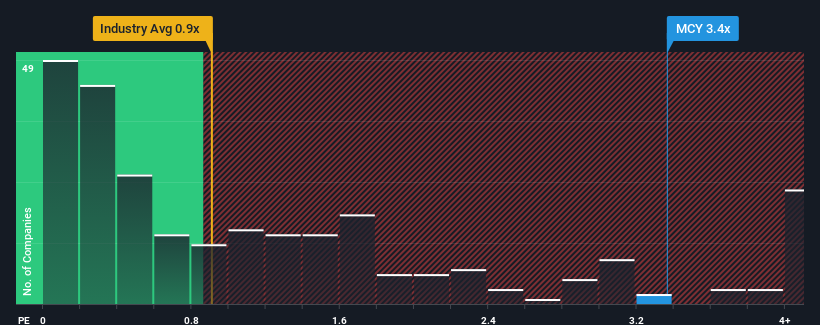- New Zealand
- /
- Electric Utilities
- /
- NZSE:MCY
Mercury NZ Limited's (NZSE:MCY) Share Price Could Signal Some Risk

Mercury NZ Limited's (NZSE:MCY) price-to-sales (or "P/S") ratio of 3.4x may not look like an appealing investment opportunity when you consider close to half the companies in the Electric Utilities industry in New Zealand have P/S ratios below 2.1x. Nonetheless, we'd need to dig a little deeper to determine if there is a rational basis for the elevated P/S.
See our latest analysis for Mercury NZ

How Mercury NZ Has Been Performing
Recent times have been advantageous for Mercury NZ as its revenues have been rising faster than most other companies. The P/S is probably high because investors think this strong revenue performance will continue. However, if this isn't the case, investors might get caught out paying too much for the stock.
If you'd like to see what analysts are forecasting going forward, you should check out our free report on Mercury NZ.What Are Revenue Growth Metrics Telling Us About The High P/S?
The only time you'd be truly comfortable seeing a P/S as high as Mercury NZ's is when the company's growth is on track to outshine the industry.
Taking a look back first, we see that the company grew revenue by an impressive 25% last year. The strong recent performance means it was also able to grow revenue by 54% in total over the last three years. Accordingly, shareholders would have definitely welcomed those medium-term rates of revenue growth.
Shifting to the future, estimates from the four analysts covering the company suggest revenue should grow by 1.7% per annum over the next three years. With the industry predicted to deliver 1.3% growth each year, the company is positioned for a comparable revenue result.
With this information, we find it interesting that Mercury NZ is trading at a high P/S compared to the industry. Apparently many investors in the company are more bullish than analysts indicate and aren't willing to let go of their stock right now. Although, additional gains will be difficult to achieve as this level of revenue growth is likely to weigh down the share price eventually.
What We Can Learn From Mercury NZ's P/S?
Generally, our preference is to limit the use of the price-to-sales ratio to establishing what the market thinks about the overall health of a company.
Seeing as its revenues are forecast to grow in line with the wider industry, it would appear that Mercury NZ currently trades on a higher than expected P/S. The fact that the revenue figures aren't setting the world alight has us doubtful that the company's elevated P/S can be sustainable for the long term. This places shareholders' investments at risk and potential investors in danger of paying an unnecessary premium.
You should always think about risks. Case in point, we've spotted 3 warning signs for Mercury NZ you should be aware of, and 1 of them is a bit unpleasant.
If these risks are making you reconsider your opinion on Mercury NZ, explore our interactive list of high quality stocks to get an idea of what else is out there.
New: Manage All Your Stock Portfolios in One Place
We've created the ultimate portfolio companion for stock investors, and it's free.
• Connect an unlimited number of Portfolios and see your total in one currency
• Be alerted to new Warning Signs or Risks via email or mobile
• Track the Fair Value of your stocks
Have feedback on this article? Concerned about the content? Get in touch with us directly. Alternatively, email editorial-team (at) simplywallst.com.
This article by Simply Wall St is general in nature. We provide commentary based on historical data and analyst forecasts only using an unbiased methodology and our articles are not intended to be financial advice. It does not constitute a recommendation to buy or sell any stock, and does not take account of your objectives, or your financial situation. We aim to bring you long-term focused analysis driven by fundamental data. Note that our analysis may not factor in the latest price-sensitive company announcements or qualitative material. Simply Wall St has no position in any stocks mentioned.
About NZSE:MCY
Mercury NZ
Engages in the production, trading, and sale of electricity and related activities in New Zealand.
Questionable track record unattractive dividend payer.


